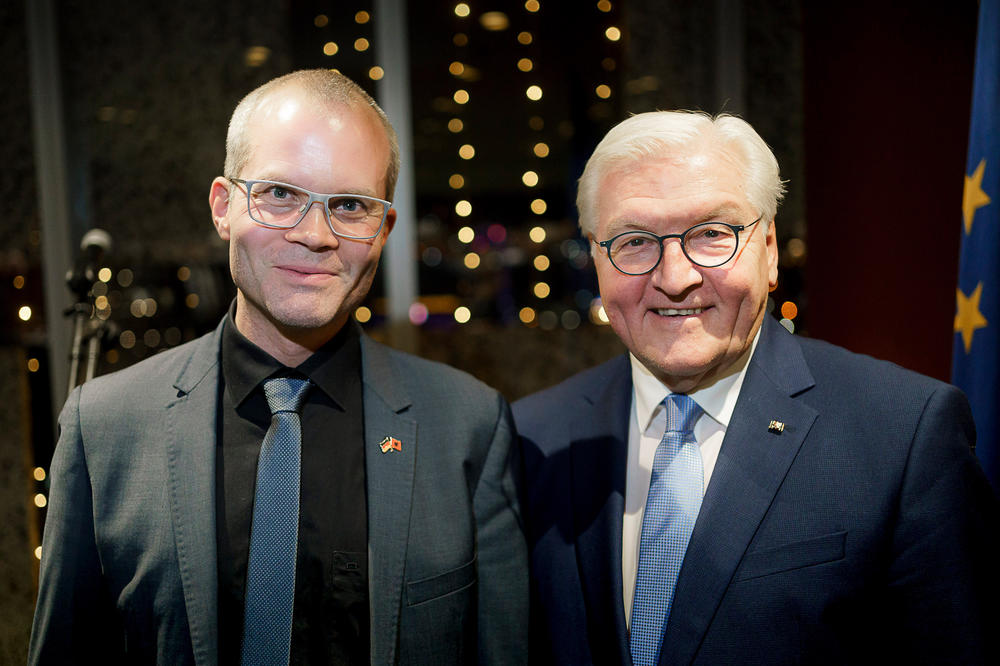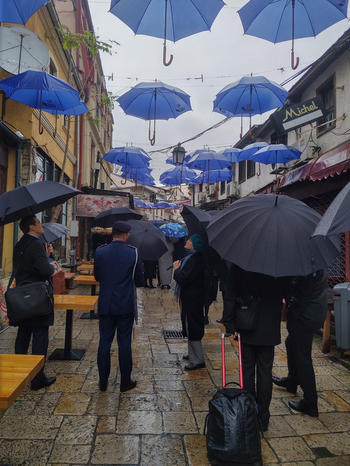Between a Fresh Start and Deadlock
Traveling through North Macedonia and Albania with the German President
Jan 30, 2023
At the end of November, Germany’s Federal President Frank-Walter Steinmeier went on a four-day visit to North Macedonia and Albania. Benjamin Langer, a member of staff from Freie Universität Berlin and longstanding expert on Macedonian culture and language, joined the president’s delegation for the trip.
Macedonia has been a European Union membership candidate since 2005. The country has, however, come up against many obstacles along the road to Europe. To start with, the accession procedure was held up for years by a dispute with Greece over the name Macedonia. The southerly neighbor called upon the country to rename itself in order to avoid confusion with the historical region of Macedonia – the home of Alexander the Great, part of which lies in Greece. In 2019, the government in Skopje finally agreed to change the name. Macedonia then became the Republic of North Macedonia in what the people felt to be a painful compromise. This problem had only just been sorted out when the eastern neighbor came knocking: Bulgaria demanded that North Macedonia acknowledge common historical and cultural roots, and recognize the Bulgarian minority living within its borders.
“That may sound harmless at first, but it soon took on another dimension,” says Benjamin Langer. “In the same breath, the Bulgarian government declared that they’ll never recognize the Macedonian language because they believe it’s merely a Bulgarian dialect.”
Benjamin Langer works in the Academic Relations unit that is part of the Division of International Affairs at Freie Universität Berlin. He is an expert on Macedonian culture and language. Langer lived in Skopje for four years and wrote his doctoral thesis about the country. He has also translated numerous Macedonian literary works into German. When the German Federal President Frank-Walter Steinmeier traveled to North Macedonia, Langer joined the entourage as a special guest.
Federal President Frank-Walter Steinmeier with Benjamin Langer at a reception in Tirana.
Image Credit: bpa (Jesco Denzel)
“Due to the new situation, support for EU integration has shrunk enormously among North Macedonians,” says Langer. “A lot of people are frustrated and disappointed. They want to be part of the EU, but they’ve seen deadlocks happen time and again for almost twenty years now.”
The German president has sent out a signal with his recent visit. Frank-Walter Steinmeier has given the people of Macedonia courage and strength to continue along the road to European integration, even if it is a rocky one. The accession talks have been put on hold again for the time being because of the dispute with Bulgaria. “As things stand, they can only move forward if they amend the constitution so that the Bulgarian minority in Macedonia is officially recognized,” explains Langer. “The two-thirds majority needed in parliament is not in sight though. This is also because agreement with Bulgaria on historical and cultural issues has become a criterion for membership.”
A rainy walk through the old town of Skopje, under a sky formed by EU umbrellas.
Image Credit: Benjamin Langer
The status of candidate country has brought about many positive changes in North Macedonia. For example, a large number of infrastructure projects have been completed across the country with European funding. The North Macedonian government has managed to boost the economy in many areas thanks to foreign investment. Nonetheless, reforms are still needed, for example, within the legal system and in the fight against corruption.
“Due to the long-running deadlock in EU membership talks, many young people in particular no longer see any prospects in the country,” says Langer. “Emigration has reached dramatic levels.” Due to demand, the embassies of European states are now even having to allocate appointments by drawing lots.
When the delegation stopped off at a German company, he was therefore pleased to see Macedonian staff being trained using the German dual system. The itinerary also included a wind farm – the first of its kind in the Balkan region – which was set up with German investments.
Langer spent two days touring North Macedonia with the delegation. They then moved on to Albania for a further two days. Being a special guest, Langer followed the official itinerary, only switching to a parallel cultural program while the politicians attended their meetings. “We enjoyed many rewarding conversations,” says Langer. “And, of course, it was also an honor for me to travel abroad and, to a certain extent, represent Germany and Freie Universität.”
German Federal President Frank-Walter Steinmeier giving a speech before the parliament of North Macedonia in Skopje.
Image Credit: Jesco Denzel
Langer became interested in Macedonia after graduating from his university studies in German literature. He then applied to join the Lectureship Program of the Robert Bosch Foundation. “I was actually hoping to go to Romania,” says Langer. “The fact that I ended up in Macedonia was thanks to the selection committee – I’m grateful to them to this day.” Langer managed to stay there for four years as he moved on from the Bosch Lectureship straight to a DAAD lectureship. He also used the opportunity to learn the language. He is fascinated by Macedonian culture – in particular, because it remains fairly unknown in Germany. Finally, Langer wrote his doctoral thesis on the portrayal of Macedonia in German-language literature and started to translate Macedonian literature into German.
Langer is now one of the most renowned translators for Macedonian literature. In 2017, he was awarded the Blaže Koneski Medal by the Macedonian Academy of Sciences and Arts for his services.
“For me, the invitation from the President’s office was further recognition of my work to date in the German/Macedonian cultural exchange,” says Langer. When the Federal President gave his speech in the North Macedonian parliament during the trip, things came full circle. Frank-Walter Steinmeier used a quote from the novel “Pirej” by Petre M. Andreevski. This is considered to be a classic in Macedonian literature – and, the German translation is, of course, the work of Benjamin Langer.
This article originally appeared in German on December 23, 2022, in campus.leben, the online magazine of Freie Universität Berlin.




